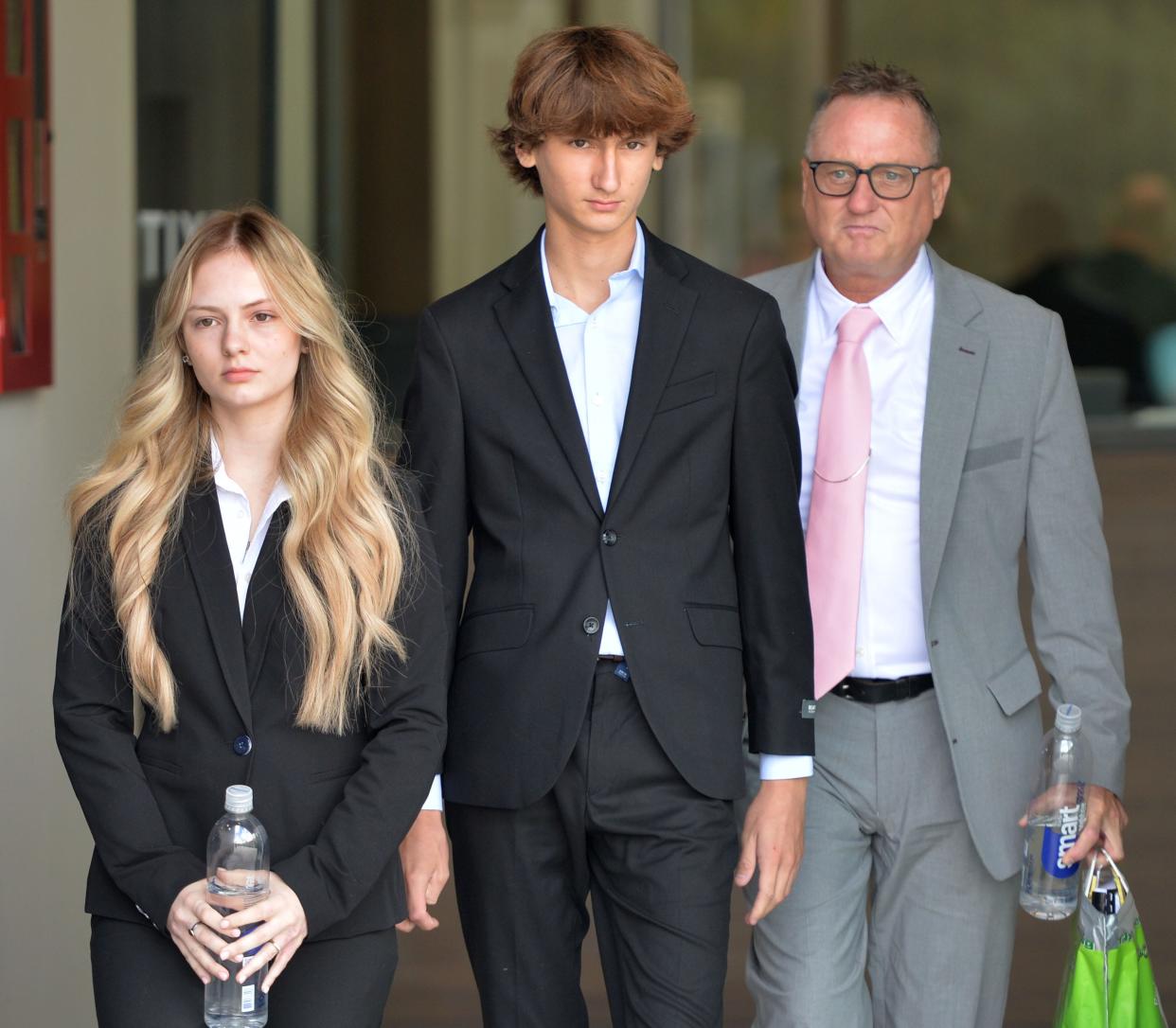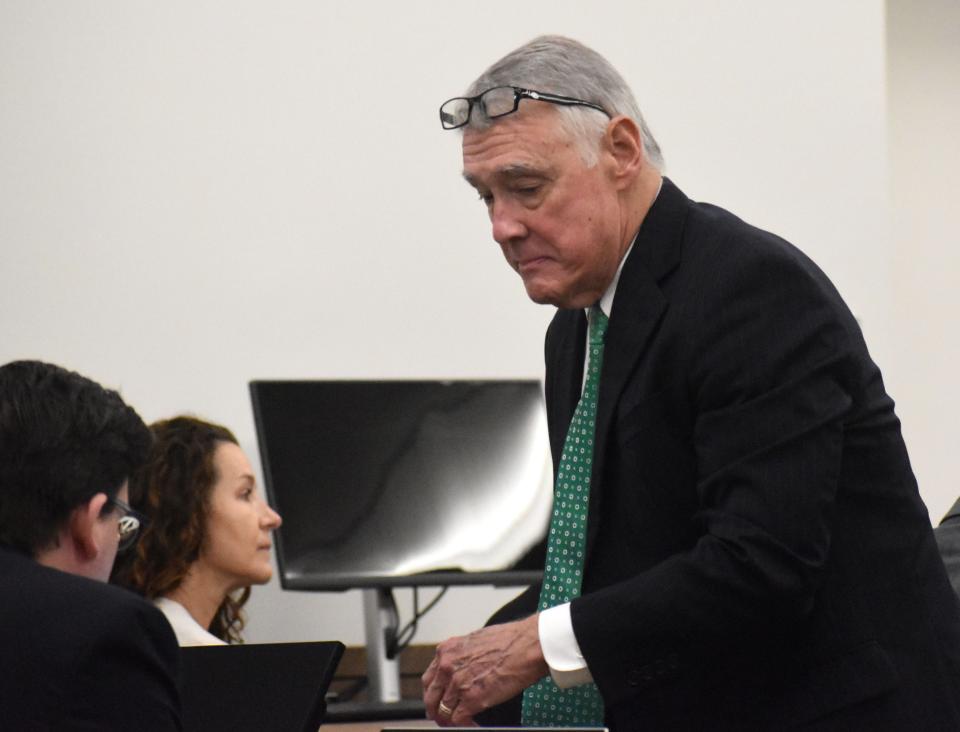'Take Care of Maya' trial: Pain medicine specialist testifies about Maya's crippling pain

“Her feet were turned inward.” “She was sensitive to touch.” “She was in a wheelchair.”
Over the course of Thursday and Friday of the highly publicized civil case involving a Venice family suing the St. Petersburg-based Johns Hopkins All Children’s Hospital, witnesses consistently brought up the same descriptions when recounting how Maya Kowalski appeared when they met her.
A pain medicine specialist, a child neuropsychologist, physical therapists and a friend of Beata Kowalski were among those called to testify about treatments provided to Maya Kowalski between 2015 and 2017 and other issues pertinent to the case.
'Take Care of Maya': See complete coverage of the ongoing civil trial.
The Kowalski family sued All Children’s Hospital in 2018 for false imprisonment, negligent infliction of emotional distress, medical negligence, battery, and other claims more than a year after the family matriarch, Beata Kowalski, took her life following allegations she was abusing her daughter.
The family took 10-year-old Maya Kowalski to All Children’s Hospital in October 2016 after she complained of severe stomach pain, believed by the family to be a relapse of her Complex Regional Pain Syndrome, a disorder that impairs the central nervous system and heightens pain sensations. The illness is sometimes also referred to as Reflex Sympathetic Dystrophy Syndrome.
Maya Kowalski was separated from her family, friends, and community following a Florida Department of Children and Families investigation and ordered by a judge to remain at the hospital. She remained separated for 91 days before reuniting with her father and brother shortly after her mother’s death.
CRPS pain feels like sticking your hand “inside a hot fire stove”
Dr. Pradeep Chopra, a pain medicine specialist who studied anesthesia, critical care and pain management for six years at Harvard Medical School, first met Jack, Kyle and Maya Kowalski on Jan. 17, 2017, in Rhode Island just days after then 11-year-old Maya was discharged from Johns Hopkins All Children’s Hospital.
Chopra spent over five hours with Maya Kowalski that day, interviewing and examining her, and then spent days pouring over 5,000 pages of her records he’d received regarding her medical history.
“I don’t want my thinking to be biased by other people’s reports,” Chopra said.
Chopra explained to the jury on Thursday that CRPS is one of the few pain conditions that are actually visible, unlike a headache, and there are several criteria to diagnose the illness. However, not all of the criteria need to be met for it to be a CRPS diagnosis.
Some of the criteria include severe, excruciating pain with no explanation for it; temperature differences between limbs; skin discoloration; swelling around certain limbs; unspecific and painful lesions that can range from small splotches to huge blisters; brittle nails; hair changes; and dystonia, which is when the muscles involuntarily contract on themselves.

“We’re talking about the world’s worst pain,” Chopra said. “I mean this pain is worse than amputation pain. This pain is worse than childbirth pain.”
Most patients have described the pain as if they stuck their hand “inside a hot fire stove” and they can’t remove it, Chopra said.
Chopra told the jury he has seen many patients with CRPS over the course of his career and described the condition as being a lifelong disease, often called a suicide condition because many people don’t believe the patient. Chopra added that it’s more difficult for young women who suffer from CRPS to be diagnosed as doctors often believe it is a psychological problem or that they’re faking it.
Chopra said that when Maya's treatments for her CRPS suddenly stopped when she was admitted to All Children's Hospital, it permanently aggravated her condition. Chopra added that the stress of having people constantly touching her while at the hospital, repeatedly triggering pain, inflamed her CRPS.
Ethen Shapiro, a Hill Ward Henderson attorney representing the hospital, questioned if Chopra had known that Maya had five ketamine infusions in the days leading up to her admission into All Children’s Hospital in October 2016 and that Maya Kowalski had indicated in a quality-of-life survey she was feeling a zero — or that she'd want to stay in bed all day and felt helpless about life.
Chopra felt that was normal for a 10-year-old child experiencing CRPS and that Maya will be sick with crippling pain for most of her life.
When asked if ketamine was addictive or harmful, Chopra adamantly stated it is one of the safest drugs that can be used under any circumstance, adding there were no withdrawal symptoms.
Day 3 of trial: Jury hears from family physician, psychologist during third day of 'Take Care of Maya' trial
'Take Care of Maya' trial: Sexual abuse allegations arise, could be added to complaints
On Friday, when defense attorney Howard Hunter was questioning Dr. Carl Barr, a child neurologist who saw Maya Kowalski in February 2016, Barr said that typically any medication like ketamine can have withdrawal symptoms, like nausea, vomiting or tremors, although some patients can take the anesthetic without having withdrawal effects.
Barr admitted that he doesn't treat CRPS patients with ketamine because of how potent the drug is, and it requires a certain level of preparedness in case a "catastrophic" event occurs.
Barr added that within his referral network, no one would conduct a ketamine coma, and that he had never heard of a 9-year-old child being put in a ketamine coma prior to Maya.
Hunter also firmly pressed Barr on the fact that he based his assessment of Maya Kowalski solely on what Beata Kowalski had relayed to him about her medical history and a physical exam he performed during Maya's one-time visit in February 2017. Barr also noted he never diagnosed Maya with CRPS and had "no objective findings to support the diagnosis."
Hunter highlighted in his questioning that in a report by Dr. Barr, he noted that the ketamine treatment in September only improved Maya's condition for six days before her symptoms returned and were worse.
"Maya's condition worsened to the point where she could not eat or drink, and she was constantly in pain," the report reads.
Physical therapist, assistant describe Maya’s conditions during therapy
The jury also heard from a physical therapist who treated Maya Kowalski during a stay at Tampa General Hospital in 2015, and a physical therapy assistant who saw Maya right before and after she went into All Children’s Hospital in October 2016.
Both therapists said when they first met Maya Kowalski she was in a wheelchair and was very weak in most of her body.
Physical Therapist Marissa Higgens, who worked at Tampa General Hospital in 2015, cared for Maya Kowalski in August that year and said that Maya sincerely tried improving. Despite their best efforts, Maya was discharged still in a wheelchair and couldn't stand without copious amounts of assistance.
Day 2 of 'Take Care of Maya' trial: Younger brother, uncle testify
More trial coverage: Trial begins in 'Take Care of Maya' case, attorneys lay out what to expect
Shapiro noted in his questioning of Higgens that on the patient progress forms filled out by therapists, two of the "barriers for discharge" that were listed included attitude of family and attitude of patient. Higgens said that meant in terms of Maya's pain.
Rachel DeYoung, a physical therapy assistant who worked with Maya Kowalski before and after her stay at Johns Hopkins All Children’s Hospital, said Maya Kowalski attempted every exercise she was given even if it was painful. The therapy assistant added that the ketamine treatments and the trip to Mexico seemed to help with Maya’s progress and she had appeared close to getting out of her wheelchair before October 2016.
While the pain could be a lot at times, Maya wasn’t the type of child to scream, DeYoung said. Instead, she said Maya was stoic most of the time, though occasionally tears would well in her eyes if the pain was a lot.
When Maya Kowalski again returned for outpatient physical therapy after being at the hospital, DeYoung described her as appearing to be much thinner, having a few abrasions on her legs, being in more pain and that her dystonia was worse. However, the 11-year-old was determined to get better, and despite only going to therapy until August 2017, Maya continued her home exercise program.
Parent of child with CRPS who knew Beata Kowalski breaks down during testimony
Megan Boland paused occasionally during her testimony Friday, tears streaming down her face. The native Coloradan appeared via Zoom from her North Carolina home.
Boland is a mother of a 19-year-old son with CRPS and is part of Ferocious Fighters, a non-profit started by Boland’s son that supports those with CRPS and their families. Beata Kowalski joined the group’s Facebook page in 2016 and became close with Boland, who offered her support through Facebook messages, phone calls and sending a monthly care package through the nonprofit.
Boland was one of the last people to speak with Beata Kowalski before she took her life in the late hours of Jan. 7, 2017.
Beata Kowalski called Boland following a court hearing and was very upset, Boland recalled. The Polish immigrant told Boland that her daughter had cried during the hearing, but Beata was barred by the judge from giving her daughter a comforting hug. Boland recalled that Beata Kowalski didn’t see a way for this to ever end and she couldn’t see a way to keep fighting if nothing she did helped her daughter.
“It was really hard,” Boland said as she cried. “I was in a position where I was there to support and help parents and I definitely feel like I failed to help her see another way.”
In case you missed it: Venice family drops social worker from lawsuit against All Children's Hospital
What to know: What's happening in 'Take Care of Maya' case? Hearing sets parameters for jury selection
Gabriela Szymanowska covers the legal system for the Herald-Tribune in partnership with Report for America. You can support her work with a tax-deductible donation to Report for America. Contact Gabriela Szymanowska at gszymanowska@gannett.com, or on Twitter.
This article originally appeared on Sarasota Herald-Tribune: 'Take Care of Maya' trial: Doctors, therapists testify about CRPS
